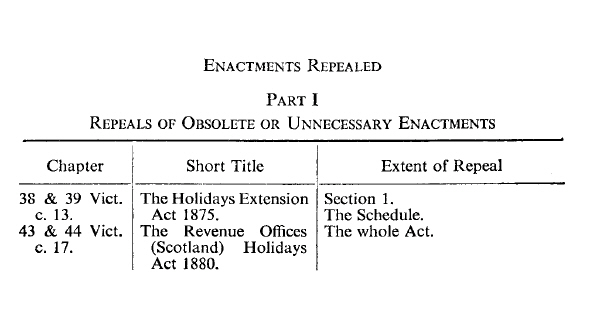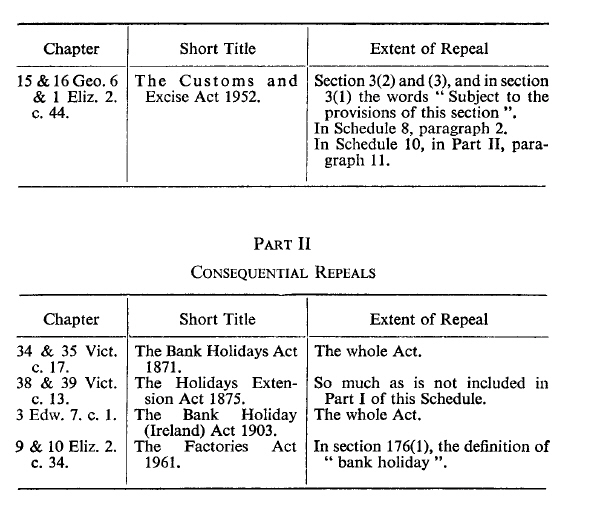
Banking and Financial Dealings Act 1971
1971 CHAPTER 80
An Act to make new provision in place of the Bank Holidays Act 1871, to confer power to suspend financial and other dealings on bank holidays or other days, and to amend the law relating to bills of exchange and promissory notes with reference to the maturity of bills and notes and other matters affected by the closing of banks on Saturdays, and for purposes connected therewith.
[16th December 1971]
1 Bank holidays.U.K.
(1)Subject to subsection (2) below, the days specified in Schedule 1 to this Act shall be bank holidays in England and Wales, in Scotland and in Northern Ireland as indicated in the Schedule.
(2)If it appears to Her Majesty that, in the special circumstances of any year, it is inexpedient that a day specified in Schedule 1 to this Act should be a bank holiday, Her Majesty may by proclamation declare that that day shall not in that year be a bank holiday and appoint another day in place of it; and the day appointed by the proclamation shall, in that year, be a bank holiday under this Act instead of the day specified in Schedule 1.
(3)Her Majesty may from time to time by proclamation appoint a special day to be, either throughout the United Kingdom or in any place or locality in the United Kingdom, a bank holiday under this Act.
(4)No person shall be compellable to make any payment or to do any act on a bank holiday under this Act which he would not be compellable to make or do on Christmas Day or Good Friday; and where a person would, apart from this subsection, be compellable to make any payment or to do any act on a bank holiday under this Act, his obligation to make the payment or to do the act shall be deemed to be complied with if he makes or does it on the next following day on which he is compellable to make or do it.
(5)The powers conferred on Her Majesty by subsections (2) and (3) above may, as respects Northern Ireland, be exercised by the [Secretary of State].
(6)The provision made by this section for January 2nd or 3rd to be a bank holiday in Scotland shall have effect for the year 1973 and subsequent years.
Subordinate Legislation Made
Textual Amendments
Modifications etc. (not altering text)
2 Power to suspend financial dealings.U.K.
(1)If it appears to the Treasury necessary or expedient so to do in the national interest, they may by order (made by statutory instrument, which shall be laid before Parliament after being made) give, with respect to a day specified in the order, all or any of the following directions, namely:—
(a)a direction that, subject to any exceptions for which provision may be made by the order, no person carrying on the business of a banker shall, except with permission granted by or on behalf of the Treasury, effect on that day, in the course of that business, any transaction or, according as may be specified in the order, a transaction of such kind as may be so specified;
(b)a direction that, subject as aforesaid, [no person]shall, on that day, except with permission so granted, deal in any foreign currency or, according as may be specified in the order, foreign currency of such kind as may be so specified;
(c)a direction that, subject as aforesaid, [no persons]shall on that day, except with permission so granted, deal in any gold [or, according as may be specified in the order, gold of such kind as may be so specified];
(d)a direction that, subject as aforesaid, no person shall on that day, except with permission so granted, deal in silver bullion;
(e)a direction that, subject as aforesaid, no member of any commodity exchange or, as the case may be, of any such commodity exchange as may be specified in the order, shall, on that day, except with permission so granted, deal thereon in futures in any commodity or, according as may be so specified, in futures in a commodity of such kind as may be so specified;
(f). . . . . . . . . . . . . . . . . . . . . . . . . . . . . . . .
(g)a direction that no member of a stock exchange in the United Kingdom shall, on that day, effect any transaction on that exchange. [;and
(h)a direction that, subject as aforesaid, no building society shall, on that day, except with permission so granted, effect in the course of its business any transaction or, according as may be specified in the order, a transaction of such kind as may be so specified.]
(2)Subsection (1)(a) above shall not authorise the giving of directions to a person carrying on the business of a savings bank in respect of that business, . . ..
(3)An obligation on a person to do a thing on a day on which he is prevented from doing it by an order under this section, or is unable to do it by reason of any such order, shall be deemed to be complied with if he does it so soon as practicable thereafter.
(4)A person who knowingly or recklessly contravenes a direction given by an order under subsection (1) of this section shall be guilty of an offence and liable—
(a)on summary conviction, to a fine of not more than £400;
(b)on conviction on indictment, to imprisonment for not more than two years or to a fine or to both.
(5)Where an offence under this section which has been committed by a body corporate is proved to have been committed with the consent or connivance of, or to be attributable to any neglect on the part of, a director, manager, secretary or other similar officer of the body corporate, or any person who was purporting to act in any such capacity he, as well as the body corporate, shall be guilty of that offence and shall be liable to be proceeded against accordingly.
Where the affairs of a body corporate are managed by its members, this subsection shall apply in relation to the acts and defaults of a member in connection with his functions of management as if he were a director of the body corporate.
(6)In this section—
. . . . . . . . . . . . . . . . . . . . . . . . . . . . . . . .
. . . . . . . . . . . . . . . . . . . . . . . . . . . . . . . .
[“building society”means a building society within the meaning of the Building Societies Act 1986.]
“commodity exchange” means an association established in the United Kingdom for the purpose of facilitating dealings by the members thereof in a commodity; and
[“foreign currency” means any currency other than sterling and any units of account defined by reference to more than one currency (whether or not including sterling); and “gold”includes gold coin, gold bullion and gold wafers.]
3 Bills of exchange and promissory notes.U.K.
(1)Section 92 of the Bills of Exchange Act 1882 (which, in a case in which the time limited by that Act for doing any act or thing is less than three days, excludes non-business days from the reckoning of that time, and defines such days for the purposes of the Act) shall have effect as if, in paragraph (a) of the definition of non-business days, “Saturday” were inserted immediately before “Sunday”.
This subsection shall not operate to extend any period expiring at or before the time it comes into force.
(2)For section 14(1) of the Bills of Exchange Act 1882 (under or by virtue of which the date of maturity of a bill or promissory note that does not say otherwise is arrived at by adding three days of grace to the time of payment as fixed by the bill or note, but is advanced or postponed if the last day of grace is a non-business day) there shall be substituted, except in its application to bills drawn and notes made before this subsection comes into force, the following paragraph—
“(1)The bill is due and payable in all cases on the last day of the time of payment as fixed by the bill or, if that is a non-business day, on the succeeding business day.”
(3)This section shall come into force at the expiration of one month beginning with the date on which this Act is passed.
4 Consequential and supplementary.U.K.
(1)Except as otherwise provided by this Act, in any enactment or instrument passed or made before the coming into force of this section (including an enactment of the Parliament of Northern Ireland or instrument having effect under such an enactment) any reference to a bank holiday under the Bank Holidays Act 1871 or a holiday under the Holidays Extension Act 1875 shall have effect as a reference to a bank holiday under this Act.
(2). . . . . . . . . . . . . . . . . . . . . . . . . . . . . . . .
(3)An order under section 2 above may be made with respect to a bank holiday or other day which is a non-business day for the purposes of the enactments relating to bills of exchange and promissory notes or with respect to a business day; but if a day specified under section 2(1) is otherwise a business day for those purposes, the order may declare it a non-business day.
(4)Accordingly in section 92 of the Bills of Exchange Act 1882, in the definition of “non-business days”, for the words “the Bank Holidays Act 1871 or Acts amending it” in paragraph (b) there shall be substituted the words “the Banking and Financial Dealings Act 1971”, and there shall be added as a new paragraph (d):—
“(d)a day declared by an order under section 2 of the Banking and Financial Dealings Act 1971 to be a non-business day.”
(5)The enactments mentioned in Schedule 2 to this Act (which includes in Part I certain enactments already obsolete or unnecessary apart from this Act) are hereby repealed to the extent specified in column 3 of that Schedule.
Textual Amendments
Modifications etc. (not altering text)
Marginal Citations
5 Short title and extent.U.K.
(1)This Act may be cited as the Banking and Financial Dealings Act 1971.
(2)It is hereby declared that this Act, . . . extends to Northern Ireland; . . .
SCHEDULESU.K.
SCHEDULE 1U.K. Bank Holidays
1U.K.The following are to be bank holidays in England and Wales:—
Easter Monday.
The last Monday in May.
The last Monday in August.
26th December, if it be not a Sunday.
27th December in a year in which 25th or 26th December is a Sunday.
2U.K.The following are to be bank holidays in Scotland:—
New Year’s Day, if it be not a Sunday or, if it be a Sunday, 3rd January.
2nd January, if it be not a Sunday or, if it be a Sunday, 3rd January.
Good Friday.
The first Monday in May.
The first Monday in August.
[30th November, if it is not a Saturday or Sunday or, if it is a Saturday or Sunday, the first Monday following that day.]
Christmas Day, if it be not a Sunday or, if it be a Sunday, 26th December.
3U.K.The following are to be bank holidays in Northern Ireland:—
17th March, if it be not a Sunday or, if it be a Sunday, 18th March.
Easter Monday.
The last Monday in May.
The last Monday in August.
26th December, if it be not a Sunday.
27th December in a year in which 25th or 26th December is a Sunday.
SCHEDULE 2U.K.
Modifications etc. (not altering text)




